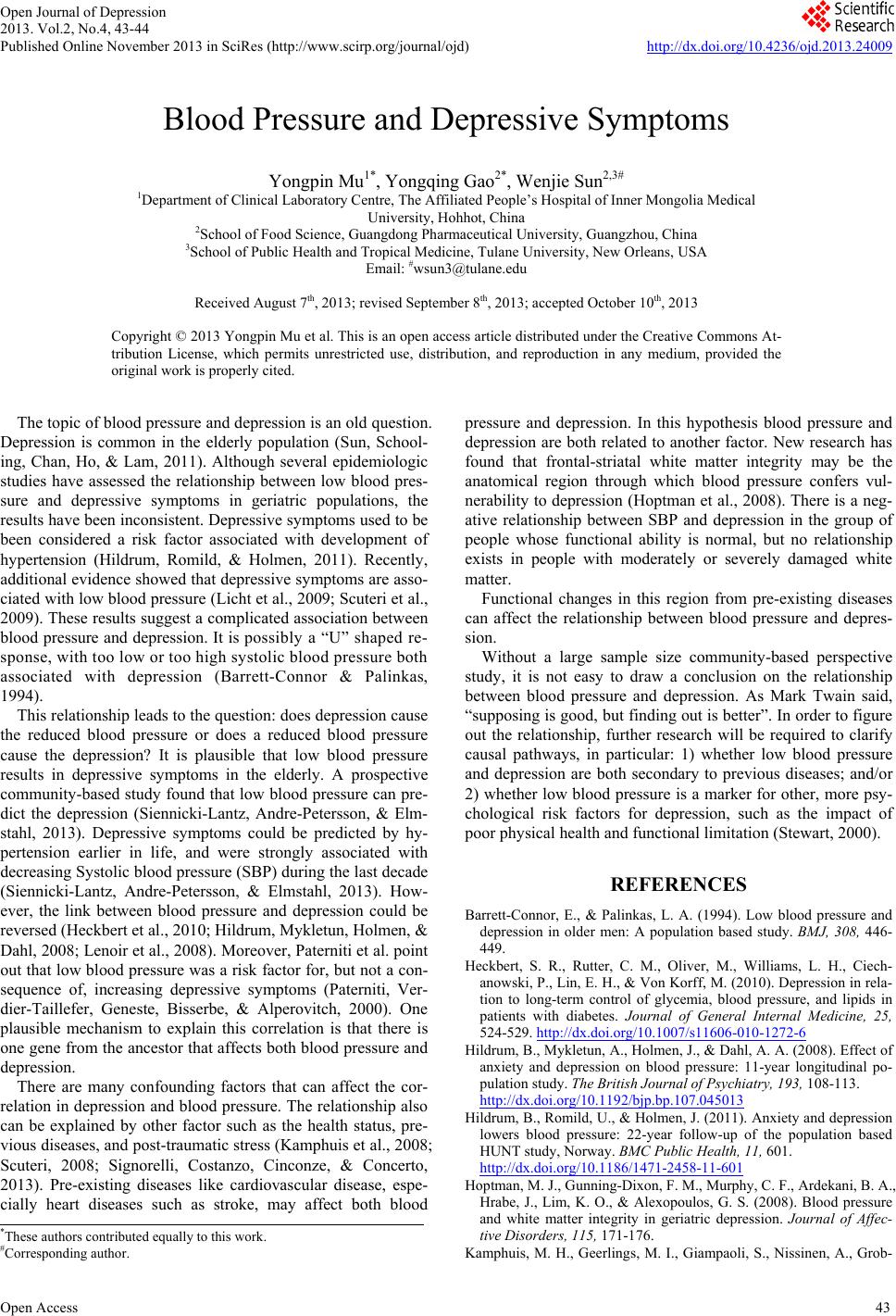
Open Journal of Depression
2013. Vol.2, No.4, 43-44
Published Online November 2013 in SciRes (http://www.scirp.org/journal/ojd) http://dx.doi.org/10.4236/ojd.2013.24009
Open Access 43
Blood Pressure and Depressive Symptoms
Yongpin Mu1*, Yongqing Gao2*, Wenjie Sun2,3#
1Department of Clinical Laboratory Centre, The Affiliated People’s Hospital of Inner Mongolia Medical
University, Hohhot, China
2School of Food Science, G uan gdo ng Ph armaceutical University , Gua ngzho u, China
3School of Public Health and Tropical M edicine, Tulane University, New Orleans, USA
Email: #wsun3@tulane.edu
Received August 7th, 2013; revised Septe mber 8 th, 2013; accepted Octob e r 10th, 2013
Copyright © 2013 Yongpin Mu et al. This is an open access article distributed under the Creative Commons At-
tribution License, which permits unrestricted use, distribution, and reproduction in any medium, provided the
original work is properly cited.
The topic of blood pressure and depression is an old question.
Depression is common in the elderly population (Sun, School-
ing, Chan, Ho, & Lam, 2011). Although several epidemiologic
studies have assessed the relationship between low blood pres-
sure and depressive symptoms in geriatric populations, the
results have been inconsistent. Depressive symptoms used to be
been considered a risk factor associated with development of
hypertension (Hildrum, Romild, & Holmen, 2011). Recently,
additional evidence showed that depressive symptoms are asso-
ciated with low blood pressure (Licht et al., 2009; Scuteri et al.,
2009). These results suggest a complicated association between
blood pressure and depression. It is po ssi bl y a “U” s ha ped r e-
sponse, with to o low or too hig h sy stolic blood pressu re both
associated with depression (Barrett-Connor & Palinkas,
1994).
This relationship leads to the question: does depression cause
the reduced blood pressure or does a reduced blood pressure
cause the depression? It is plausible that low blood pressure
results in depressive symptoms in the elderly. A prospective
community-based study found that low blood pressure can pre-
dict the depression (Siennicki-Lantz, Andre-Petersson, & Elm-
stahl, 2013). Depressive symptoms could be predicted by hy-
pertension earlier in life, and were strongly associated with
decreasing Systolic blood pressure (SBP) during the last decade
(Siennicki-Lantz, Andre-Petersson, & Elmstahl, 2013). How-
ever, the link between blood pressure and depression could be
reversed (Heckbert et al., 2010; Hildrum, Mykletun, Holmen, &
Dahl, 2008; Lenoir et al., 2008). Moreover, Paterniti et al. point
out that low blood pressure was a risk factor for, but not a con-
sequence of, increasing depressive symptoms (Paterniti, Ver-
dier-Taillefer, Geneste, Bisserbe, & Alperovitch, 2000). One
plausible mechanism to explain this correlation is that there is
one gene from the ancestor that affects both blood pressure and
depression.
There are many confounding factors that can affect the cor-
relation in depression and blood pressure. The relationship also
can be explained by other factor such as the health status, pre-
vious diseases, and post-traumatic stress (Kamphuis et al., 2008;
Scuteri, 2008; Signorelli, Costanzo, Cinconze, & Concerto,
2013). Pre-existing diseases like cardiovascular disease, espe-
cially heart diseases such as stroke, may affect both blood
pressure and depression. In this hypothesis blood pressure and
depression are both related to another factor. New research has
found that frontal-striatal white matter integrity may be the
anatomical region through which blood pressure confers vul-
nerability to depression (Hoptman et al., 2008). There is a neg-
ative relationship between SBP and depression in the group of
people whose functional ability is normal, but no relationship
exists in people with moderately or severely damaged white
matter.
Functional changes in this region from pre-existing diseases
can affect the relationship between blood pressure and depres-
sion.
Without a large sample size community-based perspective
study, it is not easy to draw a conclusion on the relationship
between blood pressure and depression. As Mark Twain said,
“supposing is good, but finding out is better”. In order to figure
out the relationship, further research will be required to clarify
causal pathways, in particular: 1) whether low blood pressure
and depression are both secondary to previous diseases; and/or
2) whether low blood pressure is a marker for other, more psy-
chological risk factors for depression, such as the impact of
poor physical health and functional limitation (Stewart, 2000).
REFERENCES
Barrett-Connor, E., & Palinkas, L. A. (1994). Low blood pressure and
depression in older men: A population based study. BMJ, 308, 446-
449.
Heckbert, S. R., Rutter, C. M., Oliver, M., Williams, L. H., Ciech-
anowski, P., Lin, E. H., & Von Korff, M. (2010). Depression in rela-
tion to long-term control of glycemia, blood pressure, and lipids in
patients with diabetes. Journal of General Internal Medicine, 25,
524-529. http://dx.doi.org/10.1007/s11606-010-1272-6
Hildrum, B., Mykletun, A., Holmen, J., & Dahl, A. A. (2008). Effect of
anxiety and depression on blood pressure: 11-year longitudinal po-
pulation study. The Briti sh J ou r n al of P sy c h ia t ry , 19 3 , 108-113.
http://dx.doi.org/10.1192/bjp.bp.107.045013
Hildrum, B., Romild, U., & Holmen, J. (2011). Anxiety and depression
lowers blood pressure: 22-year follow-up of the population based
HUNT study, Norway. BMC Public Health, 11, 601.
http://dx.doi.org/10.1186/1471-2458-11-601
Hoptman, M. J., Gunning-Dixon, F. M., Murphy, C. F., Ardekani, B. A. ,
Hrabe, J., Lim, K. O., & Alexopoulos, G. S. (2008). Blood pressure
and white matter integrity in geriatric depression. Journal of Affec-
tive Disorders, 115, 171-176.
Kamphuis, M. H., Geerlings, M. I., Giampaoli, S., Nissinen, A., Grob-
*These authors contributed equally to this work.
#Correspo nding author.